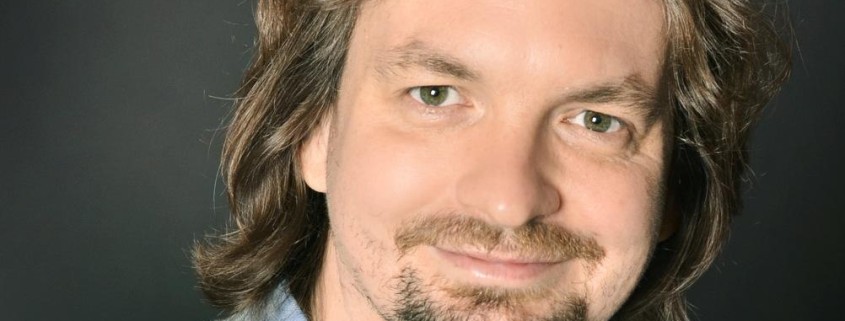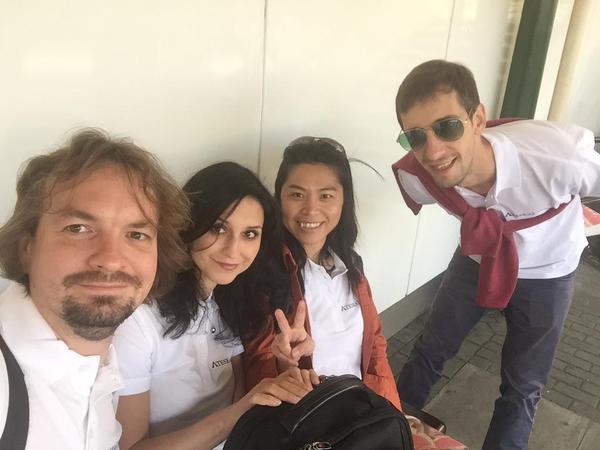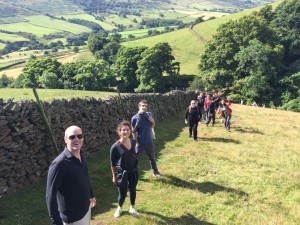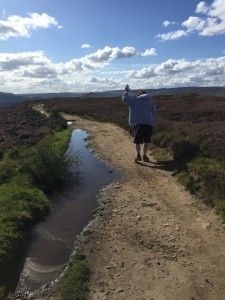TeskaLabs Co-Founder CEO Ales Teska On TechStars and StartupYard; London Vs. Prague
I spoke this week with Ales Teska, Co-Founder and CEO of TeskaLabs, We talked about TeskaLabs’ acceptance to TechStars London, their move to the UK, and their recent successful fundraising. Here’s what Ales had to say:
Ales, it’s been a big summer for you and your team at TeskaLabs. What have you been doing since leaving the StartupYard program?
Well, we were selected for Techstars London immediately following StartupYard, so we’ve been quite busy. We’ve opened a new office in Prague, where our development operations are located, and we’ve moved to London for the Techstars accelerator program. We plan to maintain our sales operation here [in London]. We have also finalized negotiations with a few existing clients, helping us survive this move to London.
But despite all this, I still managed to take a few days off this summer, which is very exciting!
The move to London was a lot of work in itself. Finding accommodation here is not easy, especially if you are working with a startup budget. We had to go back to our student years a bit, but that’s the price you pay, and we are all focused on the future.
We managed to rent a few rooms in a house in East Ham, near a tube station, so I am quite satisfied with the results.
Can you give us your impression of the TechStars London Program. How did it differ from your experience at StartupYard?
At first glance, there are a lot of similarities. The model is generally the same: a 3 month program, in 3 sections. We start with mentoring and networking in the first month, then the “build phase,” which involves a lot of workshops and practical knowledge, and finally a month or so of preparation for the Demo Day. That will be sometime in October.
But the similarities really ended there. The programs are quite different, but they complement each other perfectly, at least in our case. We’ve discussed the differences quite a bit in our team, and I must say it was surprising how different the programs really are.
First, I have to emphasize that StartupYard is a world class program- and that’s as honest an appraisal as I can give. StartupYard gives you access to knowledge and people like yourself and Cedric, who can share a great depth of experience when you need it.
Techstars, on the other hand, throws you into the deep water and makes you swim. They just make sure you’re swimming well enough and fast enough. You do a lot more things on your own. Here too, mentoring has been faster and more intense. Whereas 3-4 meetings with mentors a day in Prague felt fairly intense, here we had 6 or 7 in a half-day. That’s very tough, mentally and physically.
But it hasn’t been all grind. Techstars also treated us to a resort weekend in the mountains with hiking and relaxation.
That said, again I found that to be a lucky and nice combination for TeskaLabs. StartupYard has a “softer” environment, where things are a bit more personal and you get more individual help. We needed that at the beginning. Techstars is harsher, which suits the business environment here. That’s a transition we needed to make, but I don’t think we could have gotten here without going through StartupYard first. A lot of the skills we are using here, we learned at StartupYard.
How would you describe your experience so far with running TeskaLabs in London? What are some of the striking differences between doing business there instead of in Prague?
I have a nice example from yesterday that highlights the differences. We launched a campaign targeting nationwide transportation and logistics companies recently, and we have already had a meeting with a large international logistics outfit. The very first meeting was concerning a fairly massive project.
Anyway, in Prague, I think it’s fair to say that this first meeting would have involved some skepticism, and action would have been much slower, or possibly non-existent. But this company said to us right away: “we are not afraid of startups. We know they’re a necessary part of the economy.” That’s a striking difference with companies in the Czech Republic.
There, you have pretty high barriers when it comes to cooperating with large companies. To them, startups equal small companies, and not “startups,” which can become big and influential, or which may have novel new processes and ideas that can revolutionize a project. So in Prague, we relied on personal connections and our reputations to get us deals. There was no other way that clients would listen to us or take us too seriously.
But in London, we have been able to establish real relationships with big clients, even through cold-calling. That’s something I can’t imagine happening in Prague, frankly. And because of that, and I know it sounds crazy, but we’ve been converting 100% of our initial meetings so far. There is very little wasted time, no excuses, and more appetite for cooperation and experimentation here. There’s no fear that a startup won’t be able to deliver or will be unreliable- these big companies are willing to accept those risks.
Will you maintain operations in the Czech Republic?
We will absolutely stay in Prague, especially as concerns our R & D operations. We also have important clients there, and hope to have more in the future.
Our sales operation will shift to London for now, and we plan to expand to Germany, Switzerland, and Italy in the near future (possibly as early as the start of next year). In London, it’s been very easy to increase our sales pipeline, even with only one dedicated sales person.
My sense is that we will be concentrating on this market until the end of this year, and opening a seed investment round in at about the same time. By then, we will have validated our model and ability to market our products.
Let’s talk about investment. You’ve raised nearly 350,000 Euros. How did you put together that round so quickly?
There were a few contributing factors. First, mobile security as a market is very hot at the moment, both with clients and investors. There’s an awareness among clients that they are not secure enough, and need to offer more robust solutions to their own users and clients.
From the investor side, there is an awareness of that need that is growing. When you can deliver a product that really works, it’s easy to sell right now.
Our team is another factor, and I think that’s very important. We started as more than just a technical operation. Sales and Marketing have been baked into our team since the beginning, and that has shown investors, as well as clients, that this is not a purely technical operation, and that we are capable of handling business concerns as well as technology needs. You have to be able to do both. We’ve consistently heard from investors: “your team is amazing!”
We were also able to demonstrate quickly that there is a global market for our products, and that we have the aspiration to fulfill that need, and the necessary ambition to get there. We’ve communicated well, and clearly, thanks in no small part to StartupYard, who have been super supportive, and have contributed far more than we expected at the beginning- and we had high expectations I must say.
Credo Ventures, another investor, was considered very early on, partly because of their involvement with Cognitive Security (another security startup), and their relationship with StartupYard, obviously. We liked their team quite a bit, and we chased them from the beginning, making sure they saw that we understood how they could help us and contribute. I’m happy to have them as investors.
Techstars is also huge. We didn’t join because of money, but that came as part of the deal. It’s a validation for people who are looking to invest in us, that we are serious about going global, and using their network has been amazing. You just ask, and you get intros and contacts that are great. They’re very experienced and skilled in dealing with investors and startup challenges in terms of fundraising and hiring.
Are you looking to raise additional capital immediately?
This is a question for us right now. The plan is to open a seed round by the end of the year. We will be asking for 1-2 Million Euros. This will go, as I said, to expanding our success from the UK market to other European markets.
We are well funded for our plans in the UK, including for hiring sales people, but the seed fund will be about expanding on those operations abroad that I mentioned. If anyone reading this is a sales superstar in Europe, then please get in contact. We’re looking for the right people.
Have you faced serious challenges with hiring so far?
Well, I’m not calling it a challenge, but it’s difficult to hire people for startups by default. Particularly the caliber of talent we are looking for.
The Czech talentpool is not as ready for Startup offers as in the UK. We offer stock options for new employees, and people are not as familiar with the value in that, and they look for more traditional compensation. A monthly salary and benefits that we can’t necessarily offer right away.
We also offer participation in our success, which makes negotiations more difficult, but we have still attracted some great talent. When running a startup, a huge amount of your time is taken up seeking talent, so that has become a much bigger part of my role.
We aren’t hiring technical people in the UK, and we’re seeking a very specific profile, which takes time. The type of person we are looking for isn’t necessarily available (they are already employed) and that makes the process slower. But I think thanks to the attractiveness of our products and segment, we have had some initial talks, and it seems to be going well.
What is the state of your product offering to date? What are you currently selling, and what do you plan to provide in the near future?
Our flagship product is the mobile secure gateway, which we call SeaCat. The pricing structure has changed from a license based approach to a subscription model, which shifted us into a much more modern sales approach. I’m happy with the changes we’ve made. It makes us more flexible and more able to sell in different segments.
When you sell licenses, you lock yourself into B2B business, particularly enterprise sales. But with a multi-tier subscription model, you can talk to smaller companies, and find something to offer them as well. This allows us to scale much more smoothly from small to big business.
And from a partner perspective, the subscription model makes a lot more sense. Partners are able to secure recurring streams of revenue by selling our products along with theirs. When a mobile dev house develops something, that comes with a one-time fee. But if they can resell our solution, which is constantly updated and trouble-free for the end-client, the partner can see a monthly revenue stream, and deliver a much better and more secure product at the same time.
It’s a win for everyone, including end clients who don’t need to worry about constantly redeveloping their products to meet new security challenges.
I also have a fairly big announcement, and this is the first place I’m sharing it. We have agreed with Rackspace, Amazon, Microsoft, and Google, that we will cooperate on installing our mobile secure gateway to every data center in their cloud platforms.
This means that there will soon be 60 of our gateways across the globe, available to customers operating their backends on these cloud platforms. A huge win for us. We will cooperate on marketing this solution with the cloud providers. In addition, these providers have given us over 500K USD in services for building this solution into their services. The cost of the infrastructure is free for us.
We will be the only mobile secure gateway available on these platforms, and it will launch within the next few months. That’s a major step for us in bringing TeskaLabs’ solutions to a broad global userbase.







